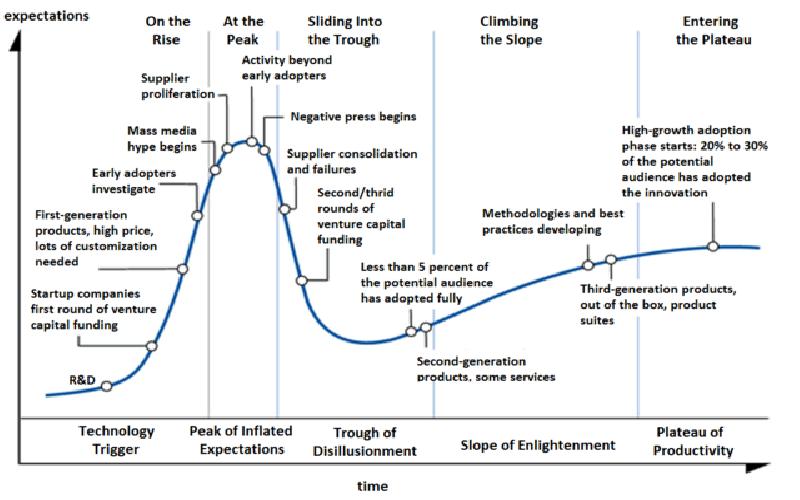Most aspects of our daily life depend on what we expect to happen. It affects our happiness, our relationships and our behaviour. Expectations are also the dominating factor in markets, business cycles as well as the extent of ethics that we practice in everyday life.
Expectations
Mark Twain said once, “Climate is what we expect, weather is what we get.” Maybe therein lies our perception of what is commonly referred to as ‘global warming’. The fact is that nature is formed of energy and matter that keeps changing its forms, and so does the temperature at different points of time and space.
We, human beings, have an inherent tendency to take things for granted, and so on one hand we pollute the environment and waste everything that is abundant, with an expectation that nothing will change, and then panic when we find our expectations are not fulfilled. But global warming or environmental pollution are not the only areas where our expectations become important. In fact, there is hardly any shade of our existence that is unaffected by our expectations. Our happiness, our relationships, our success and failures, our markets, our governments and even our ethics and morality is largely determined by our expectations.Expectations and happiness
The fact that our happiness quotient is inversely proportional to our expectations is a fact long known. Almost all religions harp on simplicity, altruism and readiness to embrace hardships as a prophesized value that takes us close to the Lord almighty. In the words of Alexander Pope, “Blessed is the man who expects nothing, for he shall never be disappointed' was the ninth beatitude.” Traditional wisdom is no different. There is a proverb in Hindi that says, “neki kar, kuyen me dal” or “do a good thing and throw it in the well”, meaning in essence that do not expect any returns from a good deed that you have done. Many of our contemporary great minds have suggested something similar. Stephen Fleming, who has lived a spectacularly successful life in the face of extraordinary adversities and is considered by many as the brightest scientific thinker since Einstein, says, "When one's expectations are reduced to zero, one really appreciates everything one does have."
Many others have expressed the same conclusion in different words. “The best things in life are unexpected - because there were no expectations”, says Eli Khamarov. Khamarov’s words take me back to my childhood, when we had few luxuries. We used to have simple food every day, but then when some day we had a relative of family friend visiting us, my mother would prepare a special dish for everyone. That unexpected windfall would cheer us all no end. Today, when we can afford to eat anything, that special happiness has become a thing of the past.
In the words of Tom Magliozzi, “Happiness equals reality minus expectations.” In my own experience, it is very true. We often get more hurt by an unexpected action of a friend, than we would have been if the person doing that to us was a stranger or a known adversary. Our unhappiness is also largely the result of unfulfilled expectations. I feel bad when my favourite cricketers get out on naught, making me agree in totality with what Elliott Larson says, “Anger always comes from frustrated expectations.” This, in fact, is very similar to the ancient Indian philosophy enunciated in ‘Srimadbhagwatgeeta’ which says “anger is the result of unfulfilled desires.”
Expectations and our relationships
Another aspect of life where expectations become central in our happiness is the realm of our relationships. Many a times, our problems in life arise because of our inability to cope with the expectations of those who are too near or dear to us. Equally frequently, it is difficult to decide what we should do, when what we wish to do is not exactly in conformity with what others expect of us. Frederick Perls, a renowned American psychoanalyst, used to respond to this dilemma in this way, “I am not in this world to live up to other people's expectations, nor do I feel that the world must live up to mine.” In fact, he was instrumental in designing the ‘Gestalt prayer’ for chanting by patients, which included the words, “I do my thing and you do yours. I am not in this world to live up to your expectations, and you are not in this world to live up to mine. You are you and I am I, and if by chance we find each other, then it is beautiful. If not, it can't be helped.”
While we need to taper our expectations of what we get from this world, we do need to maintain expectations from ourselves. As Dennis Wholey puts it, “Expecting the world to treat you fairly because you are a good person is a little like expecting the bull not to attack you because you are a vegetarian.” But expecting things from yourself is a different ball game, where you should be lead not by expectations that others have from you, but from what you have from your own self. As Joan Didion expressed, “To free us from the expectations of others, to give us back to ourselves - there lies the great, singular power of self-respect.”
Expectations and economy
Expectations are not only important in our personal lives; they also play a vital role in Economics. The modern understanding of economics is based on the ‘rational expectations hypothesis’ which states that the combined expectations of all economic agents (consumers and producers) invariably coincide with stable market equilibrium. In simple words, people expect what is absolutely rational. This hypothesis has allowed economists to do all kind of forecasting and is the very basis of econometric predominance in economic research. However, it does suffer from many shortcomings and has often failed, indicating that our expectations are not always rational. Herbert Simon was awarded a noble prize for showing that our expectations are heuristic and not mathematically rational.
For a layman, this is how expectations work. When a consumer thinks that the price of sugar is likely to rise next month, then instead of one kilogram that he would have bought otherwise, he buys two kilograms. This increases demand for sugar in the market. When sellers realise there is more demand, they increase the price. As a result, the prices rise. Expectations become a case of self fulfilling prophecy. In commodity markets, this cannot go on for a long time. After a couple of months, the households have adequate stock, so they do not buy. The demand goes down and the prices fall. As the demand begins to fall, sellers expect it to fall further. As a response, they reduce prices, which fall to the level they were at the beginning. In case of capital industry, like Cement, the cycle can be much longer. When the economy is doing well, demand for cement rises. Suppliers expect the demand to keep rising, so there is a spurt in investment and many new factories come up, increasing supply. However, often, by the time the new supply comes to the markets, the economy has slowed down a bit and demand is static. With increased supply, prices fall, and all cement companies may face losses. Since Cement industry is expected to face losses, nobody wants to invest in it and some producers exit. Gradually, the prices come back to normal. This is the usual business cycle.
Even more interesting is the phenomenon of asset markets, like stocks or housing. When I expect the price of a equity share to rise, I buy it. When many people buy like I do, the prices of that equity share rises. The expectation of the people that price of a particular good of commodity will rise actually leads to the rise of price of that good or commodity. In the same way, when people expect that the price of a equity share will fall in future, they begin to sell it. The
A similar role was played by expectations in the recent global crisis that had its genesis in the housing asset bubble. The people in United States kept buying houses because they expected the house prices to rise. The bankers and financers were giving them mortgage loans backed by security of houses, since they too expected houses prices to keep rising – so that if someone defaulted, the unpaid loan could always be recovered from the mortgaged house. Unfortunately, at some point of time, the house prices stopped rising, leading to an expectation that they may fall, and resulting in an actual fall. As the prices fell, those who had taken loans defaulted, and financiers could not recover their losses since prices of houses which were mortgaged to them had fallen. When they tried to sell those properties, it increased the supply and created an expectation of further fall in prices, as a result of which the prices actually fell further. The net crisis nearly brought down the whole global economy.
Expectations and governments
Markets are not unique in being affected by expectations. Governments are equally vulnerable to their power. When Government employees do not expect to be punished for poor performance, and when they do not expect to be rewarded for good work, their performance level drops to a level, which is barely adequate for their survival. In such cases, the motto of a good official becomes, “slow in work, fast in talking and perfect on paper.” It should not be a matter of any surprises then that the government is not capable of doing any business, and least of all being able to compete with private sector, where employees and managers expect to lose their jobs if the company becomes bankrupt, and be rewarded handsomely if the profits are raised.
Governments typically depend upon politicians and bureaucrats to run it for the people of the country. How these politicians and bureaucrats behave is critically dependent on what they expect the people to expect from them. There can be a society where corruption is the norm and people do not value honesty, sincerity and hard work, and where smartness and success are measured solely in terms of personal resourcefulness and accumulation of wealth with complete disregard to means adopted or the impact of those means on the society. In such a society, every politician or bureaucrat will expect to be considered successful only if he accumulates wealth, uses (or misuses) his power for personal gains, favours his close and dear ones and creates lobbies, closed powerful groups and fraternities (based on all commonalities including caste, religion, region, language, age, gender or service), where the general motto is “you scratch my back, I will scratch yours – our unity is our strength”.
Ironically, the response of people and their helplessness in “changing the system” also revolves around their expectations. When they expect that they cannot prevent what is happening, the wisest response is to tolerate the “system”, till one gets an opportunity to join them. If, however, there is an expectation, even a bleak one, that things may change, the people may respond differently. It is by offering this opportunity of change, and raising expectations of a new dawn, that every ‘...ism’ is able to sustain and survive, irrespective of whether it is communism or communalism, terrorism or naxalism, capitalism or consumerism, socialism or nationalism. In the short run, they ignite the expectations, motivate and achieve short term results that lead to greater expectations, and further commitment for that ‘ism’. In the longer run, the expectations become too big to sustain, and as they are not fulfilled, people get disillusioned with it. It took about a century for people to get disillusioned with Communism. Perhaps we need to ask the question “how long it will be for capitalism?”
Expectations and ethics in public life
Expectations are also central to different governmental and administrative aspects like tax compliance and evasion, as well as other aspects of ethics and corruption in public life.
Tax administration is in not just affected, but actually dependent upon the expectations people have of it. When people expect to be caught, they will not try to evade taxes and voluntary compliance is very high. When people expect not to be caught, then irrespective of the penalty or punishment that the law may prescribe, they tend to indulge in evasion. These expectations often lead to a vicious cycle. When many people evade, the resources available with tax department prevent investigation in most cases, and as a result, most people who evade taxes are never caught, strengthening expectations that evaders will not be caught by tax department, leading to further evasion. On the contrary, if somehow, the tax department is able to project its ‘catches’ and create an expectation of ‘the big brother is watching you’, then people are less likely to evade. When less cases of evasion are there, they can be caught more easily using the resources available, thereby further strengthening the expectation that evaders are likely to be caught. When that happens, voluntary compliance approaches perfection, and the “system” starts working.
If, there is some tax officer, who allows a tax evader to escape for some favour (rent), this drastically reduces the expectation of being caught, and impacts compliance by taxpayers in a manner that is far worse than the favours that the taxman may get. When a society is ridden with such corruption, people expect not be caught, or get scot free by paying a favour. In such a case, the collections are low, and the rates are high, which further bring down collections (Laffer curve). High rates impact economy negatively. Poor compliance increase cost of administration and compliance. As honest people pay the price of dishonesty, everyone turns dishonest, and the “system’ gets corrupted. On the contrary, when a tax officer sticks to his duties in the face of immense temptation, he or she enhances the expectation that evasion will be caught and evaders cannot escape by paying favours. This enhances compliance, and the net positive for the “system” and the society is far more than the favour forfeited by that officer.
Socrates used to hold that every person is a good person, and sinners indulge in sin only because they are not aware of the consequences of their actions. This school of ethics, known as ‘consequentialism’ again revolves around expectations. If people expect that their actions will have an impact on the society (which includes them and their loved ones), they may desist from crimes. On the other hand, when they expect that the society would not be affected by their actions, whether it is tax evasion or corruption, then they willingly embrace it.
Expectations practically rule our existence, and managing them can change us, as well as the “system” that we exist in!










